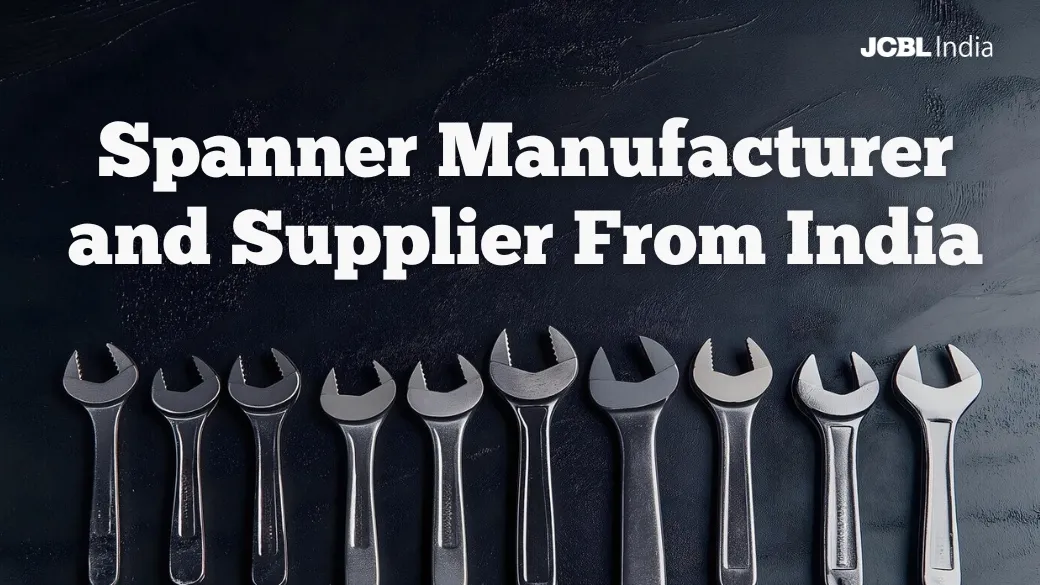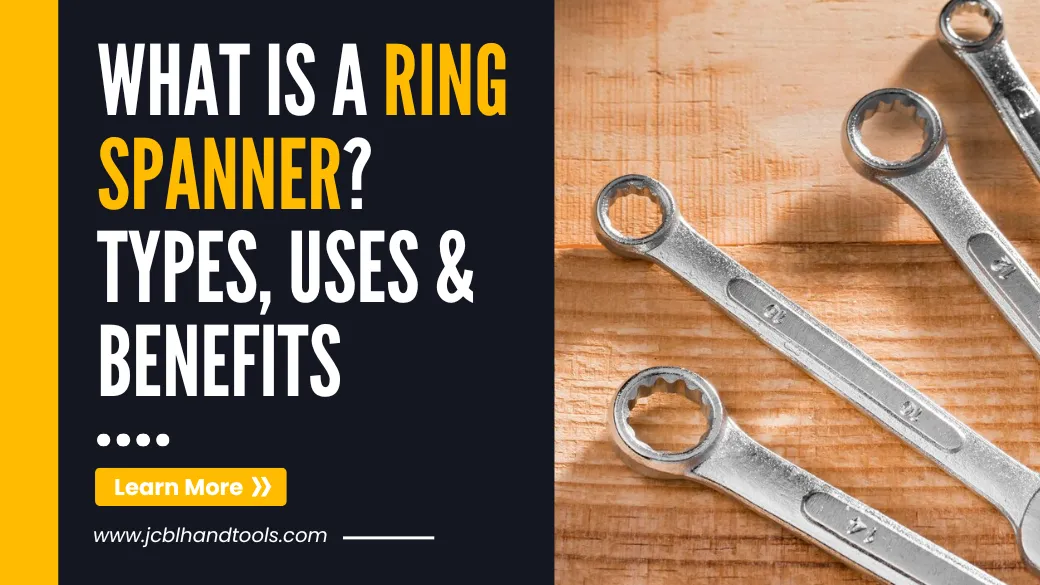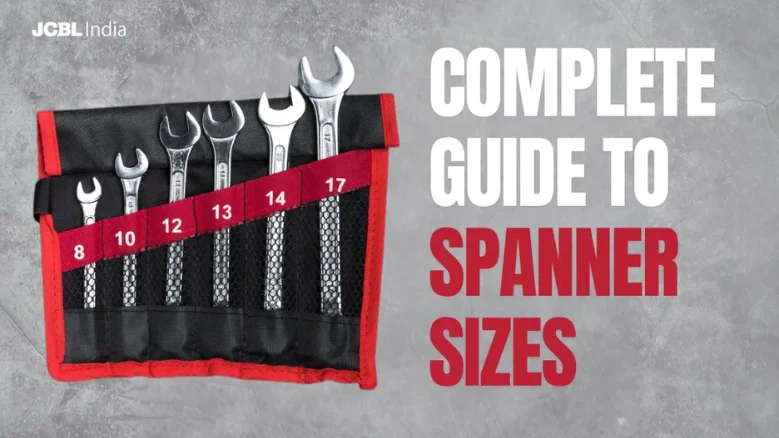What is a Box Spanner? Types, Uses, and Benefits

In the world of tools and hardware, precision and efficiency are key. Whether you’re a professional mechanic, a DIY enthusiast, or someone who occasionally fixes things around the house, the right tool can make all the difference. One such indispensable tool is the box spanner. Box spanners come in variations to meet industry-specific requirements. In this blog, we will explore different types of box spanners, their common uses, and their benefits. Also, a brief guide will be provided to help you choose the right box spanner for your task.
What Is A Box Spanner?
A box spanner, also known as a tube spanner, is a simple yet effective tool designed for tightening or loosening nuts and bolts. Unlike open-ended or ring spanners, a box spanner completely encircles the nut or bolt head, providing a better grip and reducing the chances of slippage. Made from a single piece of metal tubing, it often comes with a tommy bar (a small metal rod) that fits through holes in the spanner, allowing for added torque and control.
Box spanners are widely used in automotive repair, plumbing, mechanical industries, and household tasks where deep-set or recessed fasteners need to be accessed. They come in various sizes and types, making them highly versatile for different applications.
Types Of Box Spanners
Single Ended Box Spanner
A single-ended box spanner has a socket at one end, while the other end is either left open or designed to accommodate a handle. It is ideal for applications where only one specific fastener size is used frequently. A single-ended box spanner is used in machinery maintenance for tightening single-sized bolts. It is also common in plumbing tasks, such as tightening pipe fittings, and used in carpentry for assembling furniture and appliances.
Double-Ended Box Spanner
A double-ended box spanner features different-sized sockets on both ends, increasing versatility. This type allows users to work with two different nut sizes without switching tools. It is suitable for automotive repairs, such as working on engines and wheels. Also, it is widely used in electrical and mechanical equipment maintenance. Due to its multipurpose nature, it is preferred in household repairs, specifically for electrical and mechanical equipment maintenance.
Tubular Box Spanner
A tubular box spanner is a hollow, tube-like spanner that allows a tommy bar to be inserted through holes in the spanner body. This provides extra torque and control when loosening or tightening bolts. It is widely used in industrial machine maintenance and automobile repair shops for engine and chassis work. In plumbing, it is an essential tool for tightening deep-set nuts and bolts.
Hexagonal and Bi-Hexagonal Box Spanner
Hexagonal and bi-hexagonal box spanners feature different numbers of sockets. The hexagonal box spanner has 6-sided openings, providing a firm grip on hexagonal nuts and bolts. Meanwhile, a bi-hexagonal spanner has 12 side openings, which allows for better maneuverability in tight spaces by engaging the nut in more positions. Both are popularly used in vehicle maintenance, especially for wheel nuts and suspension systems. These are essential in mechanical and structural work requiring secure fastening; however, the bi-hexagonal versions are preferred in confined spaces.
T-Bar Box Spanner
A T-bar box spanner comes with a T-shaped handle, offering additional leverage for better control and torque. This type is commonly used for tasks requiring more force. Some of the common applications of T-bar box spanners include motorcycle and bicycle repairs, engine maintenance, and tightening and loosening bolts in heavy-duty machinery.
Deep Box Spanner
A deep box spanner is specifically designed for reaching deeply recessed nuts and bolts, which are often found in engine compartments and machinery. It is preferred in plumbing for working on recessed fittings and assembling large industrial machines. A deep box spanner is essential in automotive repairs, particularly in engine work.
Insulated Box Spanners
Insulated box spanners are coated with a non-conductive material to prevent electrical shocks, making them ideal for electrical work. It is an essential tool while working in high-voltage machinery maintenance, thus popularly used by electricians for working on live circuits and wiring. It is preferred in safety-conscious industrial settings where electrical hazards exist.
Common Uses Of Box Spanner
Box spanners are a staple in automotive repair shops. They are used to loosen and tighten spark plugs, wheel nuts, engine bolts, and other fasteners in vehicles. Their deep-reach capability makes them ideal for accessing nuts and bolts in confined spaces under the hood.
- Plumbing: In plumbing, box spanners help in tightening and loosening pipe fittings, sink taps, and compression nuts. Their ability to grip nuts securely without rounding them off makes them a preferred choice for pipework.
- Machinery Maintenance: Factories and industrial settings require constant maintenance of machines, many of which have recessed nuts and bolts. Box spanners provide easy access to these, ensuring efficient maintenance and assembly.
- Household Repairs: From assembling furniture to fixing appliances, a box spanner can be a lifesaver. Many home improvement projects involve tightening bolts that are hard to reach with traditional wrenches, making box spanners a convenient tool to have at home.
- Bicycle and Motorcycle Maintenance: Cyclists and motorcycle riders often need to adjust components like pedals, wheel bolts, and engine parts. Box spanners provide better grip and leverage, making adjustments much easier.
- Construction Work: In the construction industry, fastening and unfastening bolts on steel structures, scaffolding, and frameworks is a common task. Box spanners allow for precise tightening, ensuring structural stability.
Key Benefits Of Using A Box Spanner
Box spanners offer several advantages over other types of wrenches. Here’s why they are a must-have in your toolbox:
- Enhanced Grip and Stability: Because a box spanner fully encloses the nut or bolt head, it provides a secure grip, reducing the chances of slipping and damaging the fastener.
- Prevention of Fastener Damage: Unlike open-ended wrenches, which can round off the edges of a bolt due to uneven pressure, box spanners distribute force evenly, preserving the integrity of the fastener.
- Better Torque Application: With a tommy bar or T-handle, box spanners allow for greater torque, making it easier to loosen tight or rusted nuts and bolts without excessive effort.
- Accessibility in Tight Spaces: Their deep-reach design allows users to work in confined spaces where standard wrenches might not fit. This is particularly useful in automotive and plumbing work.
- Durability and Strength: Box spanners are typically made of hardened steel or chrome-vanadium, making them highly durable and resistant to wear and tear.
- Versatility: With multiple types and sizes available, box spanners can be used for various tasks, from industrial work to household repairs.
How To Choose The Right Box Spanner
Selecting the right box spanner depends on your specific needs. Here are some factors to consider:
- Size Compatibility: Ensure that the spanner matches the size of the nuts or bolts you intend to work with. Box spanners come in metric and imperial measurements, so double-check before purchasing.
- Material Quality: Opt for spanners made from high-quality steel, such as chrome-vanadium, to ensure durability and resistance to corrosion.
- Length and Depth: For deep-seated fasteners, choose a deep box spanner. If working in confined spaces, a shorter spanner may be more practical.
- Handle Design: Some box spanners come with T-handles or tommy bars, which provide better leverage. If torque is a concern, consider these options.
- Insulated or Non-Insulated: For electrical work, insulated box spanners are a must for safety.
- Multipurpose Sets: If you frequently work on different projects, consider investing in a box spanner set that includes various sizes for versatility.
Conclusion
Box spanners are an essential tool for anyone dealing with nuts and bolts, whether in automotive repair, plumbing, construction, or household maintenance. Their secure grip, deep reach, and torque-enhancing design make them superior to many other wrenches. By understanding the types, uses, and benefits of box spanners, you can select the right tool for the job, ensuring efficiency and precision in your work. If you don’t already own one, investing in a good-quality box spanner or a set will make your repair and maintenance tasks much easier.
Are you seeking high-quality box spanners or other hand tools for your needs? Don’t worry; your search ends here. At JCBL Hand Tools, we offer premium quality hand tools that are durable and have ergonomic designs for user comfort and task efficiency. Visit our website to check the complete product range of hand tools and experience the difference in terms of quality and durability.
For any queries, contact us at +91-9815579321 or email us at handtools@jcbl.com.




